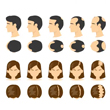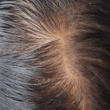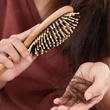What Causes an Itchy Scalp with Hair Loss and How Do I Treat It?
A doctor may diagnose your condition by taking a thorough medical history and performing a comprehensive physical examination.
It is essential to rule out other causes of an itchy scalp with hair loss, such as:
- Contact dermatitis (allergic reaction to certain substances or products)
- Seborrheic dermatitis (dandruff)
- Tinea capitis (a fungal infection on the scalp)
- Psoriasis, which is a skin disease that causes scaly patches to form on the scalp
Further tests may be necessary to determine the exact cause of your symptoms.
Learn About the Anatomy of Your Scalp
Know about your scalp and how you can keep it healthy. The skin on your scalp is sensitive since it takes care of your hair. It's essential to understand how to keep it healthy.
There are two main reasons why people develop an itchy scalp with hair loss. First, when the body lacks certain nutrients, mainly minerals, and vitamins, it can typically lose its capacity to work. A mild deficiency of trace metals in the diet can cause many problems in the scalp, including an enhancement in the growth of fungus and yeast. (2)

If you have an inadequate diet, you need to supplement it with food containing minerals and vitamins, which you need to improve the health of your scalp, prevent dandruff, and keep your hair healthy.
The second reason for this condition is when the scalp is irritated by external factors such as chemicals in shampoos or hair products that you use on your hair or heat styling tools like blow dryers or curling irons damage the cuticle of the hair. Usually, these external factors act together with nutritional deficiencies to cause problems in the scalp.
Difference Between Dandruff, Seborrheic Dermatitis, Psoriasis, and Eczema
Get the facts behind the myths about hair loss and itching. Dandruff, Seborrheic dermatitis, Psoriasis, and Eczema are not the same thing. While they have several symptoms in common, there are also significant differences.
Dandruff is a condition in which the scalp sheds its old skin cells rather rapidly. Dandruff is regarded as a normal phenomenon of life; however, it can be embarrassing to the sufferer when it becomes extreme or evident.(3)

Seborrheic dermatitis is also known as Seborrhea which refers to flaking, red skin with white scales. It usually affects the face but may extend to other body parts such as the back and chest. Usually, this condition occurs in adults and rarely in infants and young children.

Severe cases of seborrheic dermatitis can occur on most areas of your body, including your face, scalp, chest, back, and groin area. There are different types of this condition based upon where it occurs and what causes it:
- Moderate : Scaling and itching on your scalp and face
- Severe : Inflammation and crusting of your scalp and face
Psoriasis is an autoimmune disease characterized by patches of abnormal skin. These patches often appear red, itchy, dry, and scaly.

If you have an itchy scalp and notice that your hair is thinning, you might be experiencing a form of dermatitis. However, there are several different types of dermatitis, and you should understand the difference between them.
What Causes an Itchy Scalp with Hair Loss
Eczema and eczema herpeticum, psoriasis, and seborrheic dermatitis can cause an itchy scalp and hair loss. Symptoms depend on the underlying cause of the scalp. (4)
What causes an itchy scalp with hair loss? There are many possible reasons, including:
Temporary causes:
- Dandruff and seborrheic dermatitis: caused by a fungus in the scalp
- Allergic reaction: caused by allergies and irritants, such as soaps, shampoos, perfumes, and even cigarette smoke
- Hormonal changes: when there is a surge in androgen hormones or when the body tries to rid itself of excess testosterone
- Contact dermatitis: caused by shampoos, shampoos and hair gels, clothing made of wool or other fabrics, specific hair treatments, or hair colouring products
Eczema is a condition that causes inflammation of the skin. The main symptom of eczema is redness, itching of the affected area of the skin. If you have eczema on your scalp, you will have inflammation on your head that leads to an itchy scalp. Seborrheic dermatitis is often confused with dandruff, but it is more severe than dandruff. It looks similar to dandruff, but it is more yellowish. Seborrheic dermatitis leads to an itchy scalp.
How Can You Treat an Itchy Scalp with Hair Loss?
Call your physician for diagnosis and treatment. Use a variety of remedies and figure which one works best for you.
The leading cause of an itchy scalp with hair loss is inflammation or infection on the scalp. Inflammation or illness can be caused by several things, including some medications, dandruff, psoriasis, eczema, and more. Inflammation on the scalp can also be caused by conditions that are not related to the skin. It’s observed that fungus infections, lice, and head mites can cause a dry and itchy scalp. (4)
It is essential to see a doctor if you believe you have an itchy scalp with hair loss because they will make the correct diagnosis and prescribe treatments for your condition. (5)
What Causes an Itchy Scalp with Hair Loss?
An itchy scalp is a common problem. It may be caused by dry skin, dandruff, psoriasis, eczema, seborrheic dermatitis, or any of several infections, including lice or ringworm. Diagnosis may be made by your physician based on the appearance of your scalp and the results of a physical examination. (5)
A variety of treatments are available for an itchy scalp with hair loss. Your physician can discuss the possible risks and benefits of each treatment option with you. Treatment options include topical applications, oral medications, and prescription shampoos.
Topical applications may include lotions or creams that are left on the scalp to reduce scaling and itching. Lotions may contain tar, sulfur, salicylic acid, coal tar, zinc pyrithione, or selenium sulfide. Lotions should not be applied to broken skin.
An itchy scalp is often a sign of dryness. One way to manage this condition is to avoid the things that make your scalp drier, such as hot showers or too many shampoos.
Conclusion
Keep your scalp happy and itch-free via some nifty lifestyle and diet adjustments, as well as medication, depending on the severity of your case. (6)
Myth Busters HairFall

Androgenetic Alopecia - Everything You Need To Know
Have you been experiencing excessive hair fall over a prolonged period of time? It could be an early sign of androgenetic alopecia. It is a hair loss disorder common in both genders and can lead to progressive thinning and even baldness in some patients if not caught and treated early.

How To Make Hair Grow Faster For Men
A head full of healthy hair is a matter of confidence. Hair has its own mechanism of growing and shedding, and it is when this mechanism is thrown off that growth is hindered. Especially in the case of males, hair growth faces a lot of hiccups that can easily be managed.

Female Pattern Baldness - Causes & Treatments
Have you suddenly noticed an increase in the number of hair strands on your pillow in the morning? Or is your ponytail getting thinner by day? Well, you might be suffering from female pattern baldness. While that does sound scary, identifying it early on is key to treating this condition effectively. So keep reading to know what this is, how you can identify it, and most importantly, what treatments you can avail of to get your beautiful lustrous hair back.

What Are The Reasons For Hairfall?
Almost everyone experiences some amount of hair thinning over the years. Shedding around 50 to 100 single strands of hair per day is considered normal. However, losing more than 150 strands a day, experiencing sudden thinning, or developing circular bald patches on your scalp are reasons for concern. Hair loss occurs when new hair doesn’t grow fast enough to replace the amount of hair you lose daily. Hair can fall due to various reasons, with hereditary hair loss and poor nutrition being the most common hair fall reasons.

Expert Approved Tips For Hair Growth
What can be more debilitating than seeing hundreds of hair strands shedding from your scalp every time you brush your hair? Also, excessive molting occurs during seasonal changes that can be very stressful for you. Although it’s okay to lose between 50-100 strands every day, according to the American Academy of Dermatology, the problem occurs when you start shedding more than normal. But that doesn’t mean you have to feel helpless as there are ways to grow your hair back. Even if you are coping with baldness or alopecia, certain hair growth tips from dermatologists can come to your rescue. Read on to discover how these tips can be your savior when abnormal hair fall problems are in sight.
Trending Videos
+ 6 Sources
'LMRC - GGI-CO-A2-DMA-300001252-300001252-WM-L21-704'
© 2021 Dr. Reddy’s Laboratories Ltd. All rights reserved.